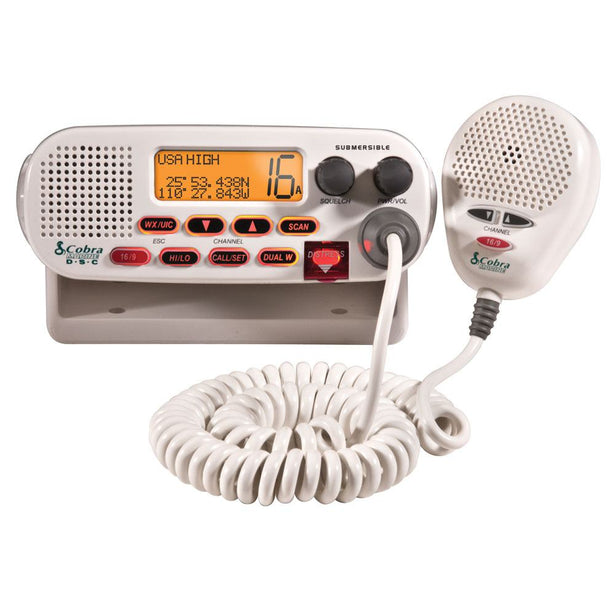
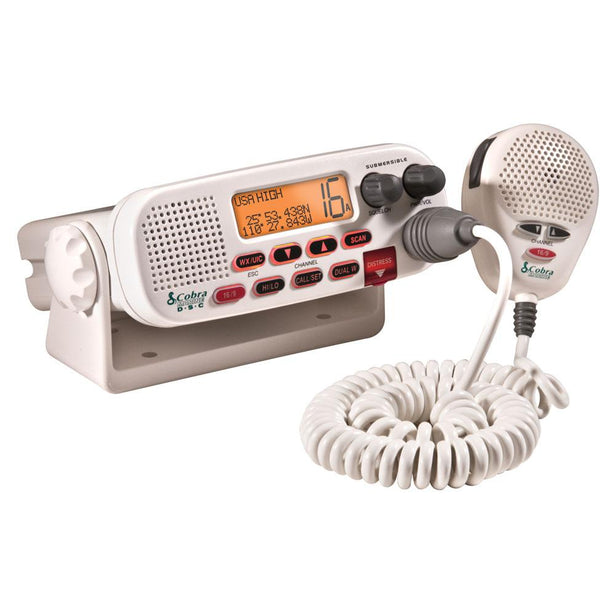
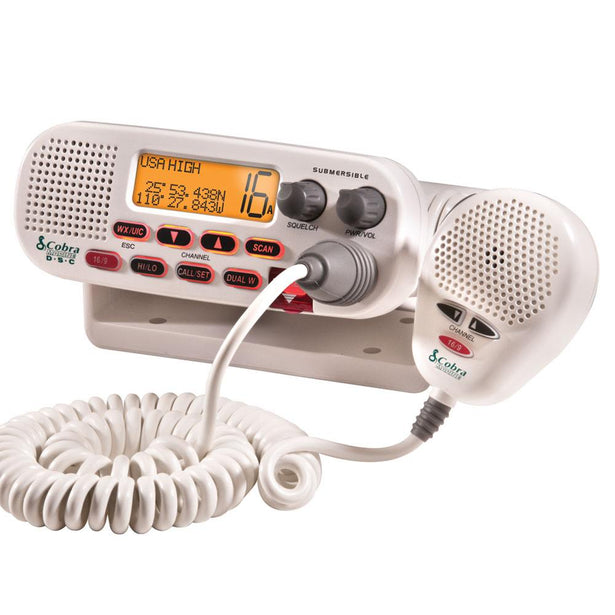



Cobra MRF45D
The Essential Marine Radio
 See Terms
See TermsDiscounts for Military, First Responders, Teachers and Students through See Terms
See Terms
Nothing Comes Close to a Cobra
When heading out on the water, a fixed-mount VHF radio is vital for communication and safety. With advanced safety features, easy menu navigation, and 24 hr access to emergency alerts and broadcasts, Cobra’s got you covered.
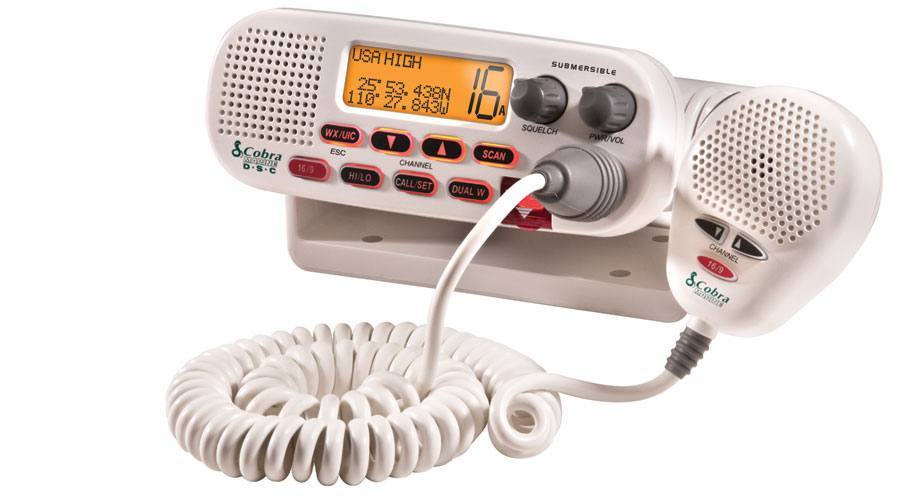
Digital Selective Calling
Class-D DSC allows you to send distress signals at the touch of a button and exchange position information with other boats or stations.
Dual Output Power
Choose between 1 or 25 watt output power for short or long communication.
US, Canada, & International Channels
Operate on any of the three established channel maps for these areas.
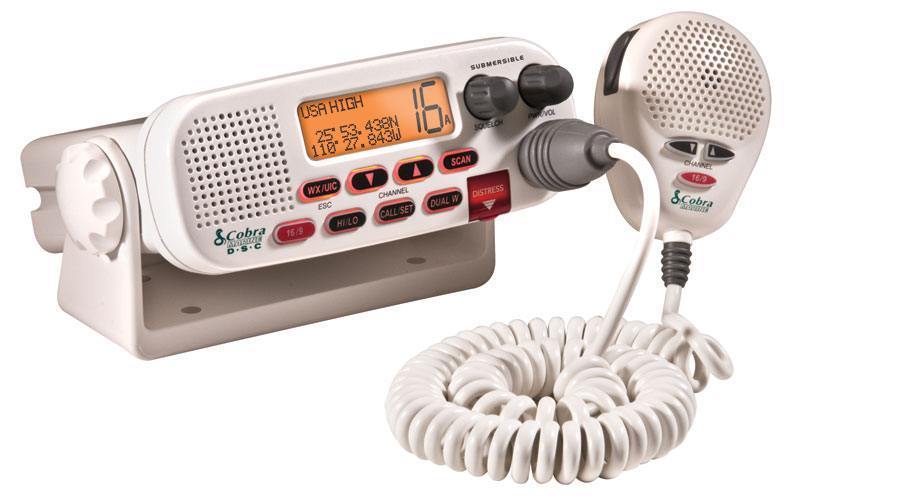
NOAA Weather
Get instant, 24 hour access to national All-Hazards and weather information on 10 NOAA weather channels.
Weather Alerts
Audible tones and a visual alarm alert you to nearby threatening weather.
FCC Compliant
Compliant with the latest FCC Specs for Class-D VHF Radios.
Class D DSC
Send distress signals at the touch of a button
NOAA Weather
Instant access to 10 NOAA weather channels
Selectable Output Power
1 or 25 watts for short or long communication
Weather Alerts
Audible and visual alarms for incoming weather threats
US, Canada, International
Operate on any of the 3 channel maps
FCC Compliant
Compliant with the latest FCC Class-D VHF radio specifications
Item # MR F45-D
SPECIFICATIONS
Weight2.42 LBS (1,100.00 g)
Height6.25" (159.00 mm)
Width2.25" (57.00 mm)
Depth7.13" (180.00 mm)
FEATURES
Class D DSC (Digital Selective Calling) - Allows you to send a distress signal at the touch of a button or exchange position information with other boats or stations.
1 or 25 Watts - Dual output power for short and long communication.
USA, Cananda & International Channels - Allows operation on any of the three different channel maps established for these areas.
10 NOAA Weather Channels - Instant access to national All Hazards and weather information, 24 hours a day.
Weather Alert - Alerts with an audible tone and visual alarm if threatening weather is nearby.
What is the range of my Cobra marine radio?
It is difficult to provide a number, because range will be affected by the following factors:
Transmit power: Higher transmit power gets better range. Transmit powers up to 25 watts are allowed.
Length of the antenna: Short antennas will get shorter range. Long antennas will get longer range.
Height of the antenna: The higher the antenna is mounted, the better the range.
Antenna tuning: Having a properly tuned antenna will maximize your range. Checking the SWR of the antenna will identify how well your antenna is tuned to the marine band.
Atmospheric conditions: Atmospheric conditions can affect radio propagation. If conditions are just right, there are times when you can transmit 100 miles or more. On other occasions you may be limited to only 10 miles. Although these extremes occur infrequently, it does serve to illustrate the effects of atmospheric conditions.
Your location: Your location will also influence the range. For example if you are located on an inland waterway where buildings and trees can block your signal, you will get less range than if you where in the middle of the ocean. With a handheld radio your range will vary depending on whether you are inside the cabin (worst range) or standing on the highest portion of the deck (best range).
Battery condition (handheld models):
Low batteries will cause your transmit power to drop, which will reduce your range.
The combination and severity of the above factors will determine your range. Several of these factors can change on a day-to-day basis.
If we were to eliminate all the negative effects, a properly setup mobile radio transmitting 25 watts will communicate as follows:
-A powerboat communicating to another powerboat: approximately 20 miles.
-A powerboat communicating toa well-equipped shore station: approximately 50 miles.
-On a sailboat with the antenna mounted at the top of the mast, communicating to another sailboat: approximately 40 miles.
-On a sailboat with the antenna mounted at the top of the mast, communicating to a well-equipped shore station: approximately 80 miles.
Handheld radios will communicate as follows:
-A 5 watt handheld will communicate approximately 7 miles to another handheld, or approximately 20 miles to a well-equipped shore station
-A 2 watt handheld will communicate approximately 5 miles to another handheld, or approximately 15 miles to a well-equipped shore station.
What is DSC (Digital Selective Calling)?
Digital Selective Calling (DSC) is a radio technology allowing enhanced distress radio messages to be sent digitally. In addition, a DSC equipped vessel with an MMSI number can make a "private" hailing call to another DSC-equipped vessel. Only the vessel being called will receive the initial contact, but the subsequent conversations will take place on an open, “working” channel, which can be monitored by any VHF equipped vessel within your broadcast range.
What is a Maritime Mobile Service Identity (MMSI)?
Maritime Mobile Service Identity (MMSI) is a unique 9 digit number that is assigned to a (Digital Selective Calling) DSC radio or an AIS unit. Similar to a cell phone number, your MMSI number is your unique calling number for DSC radios or an AIS unit. The information provided when obtaining a MMSI number is transferred into the U.S. Coast Guard's national distress database for use in emergency situations.
Is there a fee to obtain an MMSI?
MMSI numbers are free for BoatUS members or $25 for non-members. To obtain a new or change your existing MMSI#, visit: https://www.boatus.com/MMSI/MMSI/ObtainMMSI#!
Why should I register my VHF radio and obtain an MMSI number?
Your VHF radio is the single most important piece of safety equipment you can have on board your vessel. By using a VHF radio with Digital Select Calling (DSC) capability, you increase your safety dramatically by taking advantage of enhanced communications options. These options link you to other vessels and rescue facilities, providing a strong, modern safety net not offered by mobile phones while in the water.
Why is it so important to have a DSC radio with built-in GPS and/or the option to connect to an external GPS?
Having a built-in GPS in a emergency, one push of the Distress button, transmits the distress signal containing your MMSI# and location Lat/Lon information to USCG and all other DSC capable receivers within your broadcast range. Should (you) the operator become incapacitated, the radio will continue to send the mayday signal.
If your DSC radio does not have a built-in GPS, the Coast Guard urges, in the strongest terms possible, that you take the time to interconnect your DSC-equipped radio to an external GPS. Doing so may save your life in a distress situation! Here is a link to an external GPS available from Cobra https://www.cobra.com/collections/marine-accessories/products/cm300005cobrapositioningsystem
Why join Sea Tow?
As the official VHF radio of Sea Tow, we recommend it. It is the #1 choice of boaters nationwide for boat towing and expert on-water assistance. Membership offers discounts on fuel, boating supplies, restaurants, and gives you an experienced captain standing by 24/7 in case you need help while out on the water. Joining Sea Tow will help prevent out of pocket expenses and save you valuable time in the event that you do need a tow.
 |
| 





